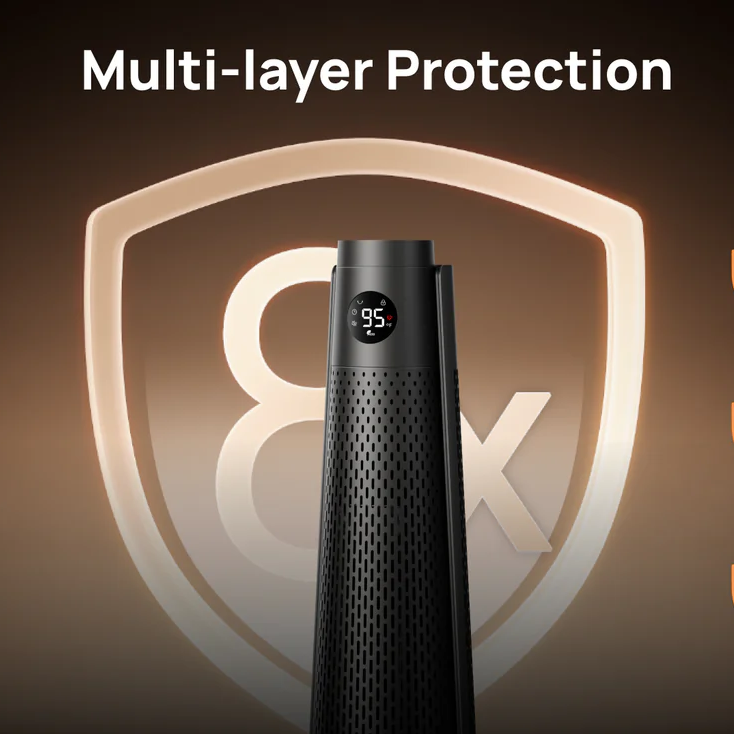You've had your space heater humming for hours, wrapping your room in a warm brace. As bedtime approaches, you can't shake off that nagging feeling. The biting cold outside seeps through the windows, and you shiver-not just from the chill, but from a flicker of worry. How long is too long to leave the space heater running?
Ideally, you should keep your heater on only when you're nearby, but let's face it - everyone's heating needs are a bit different. Balancing safety, comfort, and even energy costs can be tricky and it's natural to have concerns as the temperature drops. But don't fret! Once you first grasp the basics of space heater safety, you'll feel much more at ease about how long you can leave it running.
Understanding Space Heater Safety
1. Why Safety Matters?
Space heaters are like your trusty sidekick in the fight against the winter chill. However, with great warmth comes great responsibility! First off, fire hazards can sneak up on you, especially if your heater isn't placed at least 3 feet away from curtains, blankets, or furniture - you might as well be playing with fire (literally). It's a common mistake, but one that can lead to serious consequences if left unchecked.
Then there's the issue of overheating. Sure, a little extra warmth is nice, but too much can make your space feel more like a furnace than a snug hideaway. A few minutes of attention can go a long way in ensuring your cozy home remains safe.

2. Safety Features to Look for in Space Heaters
With that in mind, here are some essential safety features to look for:
- Tip-over Protection: This automatic shut-off feature kicks in if the heater gets accidentally knocked over, ensuring safety in busy spaces.
- Overheat Shut-off: If the heater gets too hot, this feature will turn it off, preventing potential fire hazards.
- ECO Mode: This energy-saving setting adjusts the heater's power output based on the room's temperature, helping you stay warm without overheating while saving on energy costs.
- Certification: Look for ETL or UL certification, which indicates that the heater meets strict safety standards.
- Scheduling Functions: Some space heaters come with programmable settings, allowing you to set specific times to turn on and off, making it convenient for daily use and less worrying about safety concerns.
- Safety Plug: A reliable, grounded plug is vital. Look for innovative designs, like DREO Patented Fortplug™ used in the Solaris 718, designed for a secure fit that helps prevent overheating. It's a small but crucial detail that enhances safety, letting you focus on staying warm without a second thought. For those considering a heater for potentially damp areas, an ALCI safety plug is essential for enhancing electrical safety, DREO Smart Wall-mounted Heater WH517S is designed for that, coupled with IP24 ratings, it's a great choice for bathroom use, protecting against splashes and moisture.
Additionally, having a sturdy base and a cool-touch exterior are important for preventing accidental tipping and ensuring safe handling.

Factors That Influence Duration
When it comes to how long you can run your space heater efficiently, several factors come into play.
- Room Size
The size of the room significantly affects how long you need to run your space heater. Larger spaces require more time for the heater to effectively warm the air. It's ideal to always check the heater's recommended coverage area, often listed in square feet.
If you have multiple rooms to heat, consider using additional heaters or simply moving one around. That's where the Space Heater Atom 316 comes in handy - it's compact, portable, and super easy to carry from room to room. Perfect for when you need to warm up different areas without the hassle of bulky equipment!
- Insulation
The insulation quality of your home plays a crucial role in how effectively heat is retained. Well-insulated rooms will hold heat longer, requiring less time for the heater to maintain warmth. If you think that the insulation quality of your home is not up to as expected, consider improving it by sealing drafts around windows and doors, using heavy curtains, or adding rugs to floors.
- Heater Wattage
The wattage of your space heater affects its heating capability. A heater with a higher wattage (e.g., 1500 watts) will generate more heat and can warm a room faster. In contrast, a 750-watt may take longer to heat in the same space, which might require running it for 6-10 hours to achieve the desired warmth.
Recommended Usage Times
Knowing how long to run your space heater can help you maximize comfort while ensuring safety and efficiency. Here are some handy guidelines for different situations:
During the Day vs. at Night
- During the Day: It’s generally safe to run your space heater for 6 to 8 hours during the day while you’re home and active. This allows you to enjoy warmth as you go about your daily tasks. If you're in and out of the room, consider using a timer to automatically shut it off after a few hours, especially if you tend to forget.
- At Night: If you choose to use your space heater overnight, it’s best to limit its operation to 4 to 6 hours on a lower setting. Some people prefer to set their heater to turn off about an hour after they fall asleep, which you can manage through a timer or a model with a scheduling feature. The DREO Solaris Slim H2 makes this even better with its accurate NTC sensor that keeps temperature controlled within ±1.5˚F. Plus, with customizable temperature settings from 41 to 95˚F in 1˚F increments under Eco Mode, it precisely manages heat output to help you save up to 40% on energy, giving you a cozy night without the worry.
During Home vs. Away
- When You're Home: Feel free to run your space heater for as long as needed while you’re in the room, keeping an eye on it for safety. Just ensure you’re not leaving it unattended for too long, especially if you’re moving to another area of the house.
- When You’re Away: It’s best to turn off your space heater completely if you’ll be away for more than 30 minutes to 1 hour. If you want to return to a warm home, consider setting it to turn on 30 minutes to 1 hour before you arrive, using a timer or smart controls if available.
Tips for Optimizing Your Space Heater Use
To maximize the efficiency of your space heater and minimize energy consumption, consider these practical tips:
- Use Timers: Setting a timer to turn the heater on before you arrive home or before bedtime ensures that you come back to a warm environment without leaving it running unnecessarily.
- Smart Settings: If you have a smart heater, make the most of its app controls to adjust settings remotely. For example, the DREO WH517S wall-mounted heater lets you turn it on or off and set schedules right from your phone. This way, you can ensure your space is cozy and welcoming when you need it, all while fitting seamlessly into your daily routine.
- Maintain Good Airflow: Ensure that the heater is positioned in an open space away from obstructions. Fan-forced Heaters, the DREO Solaris 718, is good to bring into play in this case. By combining the position and a fan, warm air will be circulated more evenly throughout your place.
- Pair with Insulation Improvements: Invest in additional insulation or draft stoppers to keep the warmth in. The better insulated your home is, the less time you'll need to run the heater.
Signs Your Space Heater Needs a Break
While your space heater is your trusted ally against the cold, there are times when it also needs a timeout.
When to Turn off Your Heater
- Overheating: If your heater feels excessively hot or emits a strange odor, it's time to shut it down. While modern heaters often have safety features, it's best not to take chances.
- Unusual Sounds: Listen to any odd noises like buzzing or rattling. These sounds could indicate internal issues, so if your heater starts making a racket, it's a good idea to turn it off and investigate.
- Temperature Fluctuations: If your heater can't maintain a steady temperature and constantly cycles on and off, it may have a thermostat problem. Inconsistent heating is a signal that something's not right.
- Burning Smells: If you smell something burning, it could mean dust buildup or an electrical issue. Turn it off immediately and allow it to cool before checking for any issues.
- Power Problems: If your heater keeps tripping circuit breakers, it's a sign of potential electrical problems. Avoid using it until the issue is resolved.

Final Takeaway
In the end, keeping your space warm doesn't have to be a hassle. With the right safety measures and smart usage tips, you can enjoy a snug, worry-free environment. Remember, a little attention goes a long way in ensuring a safe and inviting home.
So, kick back, relax, and let your heater do the work. If you're ready to elevate your comfort this winter, head over to the DREO space heater collection and discover your ideal heating solution today!



